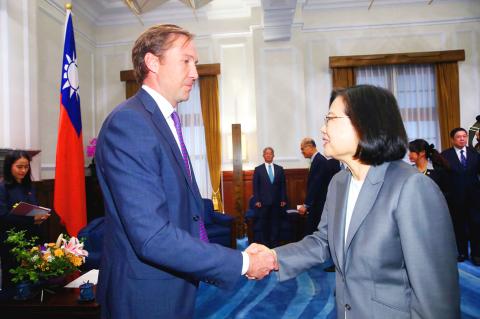President Tsai Ing-wen (蔡英文) yesterday said that Taiwan is “at the front line of the fight against anti-democratic forces” at a meeting with US Republicans in Taipei.
Over the past few years, anti-democratic and extremist forces have been on the rise around the world, she said, adding that democracy and freedom face an unprecedented challenge.
“Taiwanese will not give up or compromise a democratic way of life,” Tsai said.

Photo: CNA
From the authoritarian era to democratization, Taiwanese “have never retreated, and never will,” she said.
Taiwan would continue to act as a reliable partner of the US with regard to maintaining security in the Indo-Pacific region, she said, adding that it would work with the US to promote peaceful and stable development in the region.
Tsai made the remarks at the Presidential Office in Taipei while addressing a delegation led by Republican National Committee (RNC) cochair Tommy Hicks.
Members of the delegation included Michigan Republican National committeewoman Kathy Berden, Oklahoma Republican National committeeman Steve Curry, Colorado Republican National committeewoman Vera Ortegon, Connecticut Republican Party chairman Joseph Romano and Nebraska Republican Party chairman Dan Welch.
This is the first time that the RNC members have visited Taiwan, Tsai said.
During the meeting, Tsai thanked the US Republican Party for its support of a democratic Taiwan, “especially for including the TRA [Taiwan Relations Act] and former [US] president [Ronald] Reagan’s ‘six assurances’ to Taiwan, and reiterating the US’ strong support toward Taiwan in the party platform passed at the 2016 Republican National Convention.”
US Vice President Mike Pence and US Secretary of State Mike Pompeo have recognized Taiwan as a democratic success story on numerous occasions, and US President Donald Trump’s administration last week for the third time announced military sales to Taiwan, Tsai said.
Since the beginning of the year, the US and Taiwan have cohosted a forum titled “A Civil Society Dialogue on Securing Religious Freedom in the Indo-Pacific Region,” and, through the Global Cooperation and Training Framework, the Women’s Economic Empowerment Summit, she said.
They have also announced the establishment of an annual dialogue called the Indo-Pacific Democratic Governance Consultations to work toward making the region “more democratic, more free, more open,” she said.
This month marks the 40th anniversary of the enactment of the TRA.

NATIONAL SECURITY THREAT: An official said that Guan Guan’s comments had gone beyond the threshold of free speech, as she advocated for the destruction of the ROC China-born media influencer Guan Guan’s (關關) residency permit has been revoked for repeatedly posting pro-China content that threatens national security, the National Immigration Agency said yesterday. Guan Guan has said many controversial things in her videos posted to Douyin (抖音), including “the red flag will soon be painted all over Taiwan” and “Taiwan is an inseparable part of China,” while expressing hope for expedited “reunification.” The agency received multiple reports alleging that Guan Guan had advocated for armed reunification last year. After investigating, the agency last month issued a notice requiring her to appear and account for her actions. Guan Guan appeared as required,

Japan and the Philippines yesterday signed a defense pact that would allow the tax-free provision of ammunition, fuel, food and other necessities when their forces stage joint training to boost deterrence against China’s growing aggression in the region and to bolster their preparation for natural disasters. Japan has faced increasing political, trade and security tensions with China, which was angered by Japanese Prime Minister Sanae Takaichi’s remark that a Chinese attack on Taiwan would be a survival-threatening situation for Japan, triggering a military response. Japan and the Philippines have also had separate territorial conflicts with Beijing in the East and South China

A strong cold air mass is expected to arrive tonight, bringing a change in weather and a drop in temperature, the Central Weather Administration (CWA) said. The coldest time would be early on Thursday morning, with temperatures in some areas dipping as low as 8°C, it said. Daytime highs yesterday were 22°C to 24°C in northern and eastern Taiwan, and about 25°C to 28°C in the central and southern regions, it said. However, nighttime lows would dip to about 15°C to 16°C in central and northern Taiwan as well as the northeast, and 17°C to 19°C elsewhere, it said. Tropical Storm Nokaen, currently

PAPERS, PLEASE: The gang exploited the high value of the passports, selling them at inflated prices to Chinese buyers, who would treat them as ‘invisibility cloaks’ The Yilan District Court has handed four members of a syndicate prison terms ranging from one year and two months to two years and two months for their involvement in a scheme to purchase Taiwanese passports and resell them abroad at a massive markup. A Chinese human smuggling syndicate purchased Taiwanese passports through local criminal networks, exploiting the passports’ visa-free travel privileges to turn a profit of more than 20 times the original price, the court said. Such criminal organizations enable people to impersonate Taiwanese when entering and exiting Taiwan and other countries, undermining social order and the credibility of the nation’s